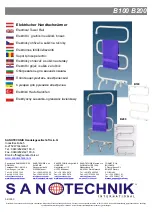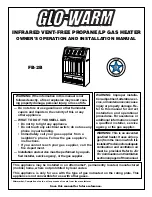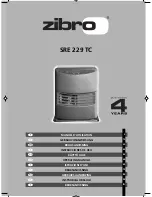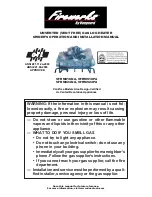
The following table represents some of the most common technical support questions we receive. Before calling us,
please read thoroughly to see if your question or problem is addressed.
PROBLEM
POSSIBLE CAUSE
SOLUTION
Water heater is not heating at all (water is flowing
but the unit is not heating at all —the outgoing
water temperature is the same as my cold water
supply) - the digital display does NOT light up.
No power or incorrect wiring.
Make sure the breakers at main electrical panel are ON. You
may have a faulty breaker or unit may be wired incorrect.
Flow rate is too low / water pressure is too
low.
Your water heater has an activation flow rate of
approximately 0.25 GPM. If your water flow rate is less than
this level, your unit will not activate. Increase the flow rate.
Water heater is not heating at all (water is flowing
but the unit is not heating at all - the outgoing water
temperature is the same as my cold water supply)
The digital display DOES light up.
Internal part failure.
Please call us for technical assistance.
Water heater is heating but the water
temperature is not hot enough.
User temperature setting too low.
Turn up the temperature setting on the unit (see General
Operating Instructions section of this manual)
Flow rate is too high.
Depending on your incoming water temperature and the
power output of your model, your water flow rate may
exceed the physical heating capacity of your water heater.
Reduce the flow rate at the faucet or slightly close the shut-
off valve installed on the inlet side of your heater to reduce
the inlet water flow rate. (see General Operating
Instructions section of this manual)
Crossed wires.
If it’s a new installation, have your electrician double check
the wiring. Is possible that the wiring is incorrect.
Voltage less that 240 volts.
The heating elements on your water heater are design for
240 volts. When use with a lower voltage, they produce less
heating power. You may need to upgrade to a larger model.
Mixing too much cold water.
You do not need to mix as much cold water with your
tankless water heater compared to when you use a
conventional water heater. You may also have an anti-scald
feature on your faucet that is mixing cold water. These
types of faucets can usually be adjusted to reduce the
amount of cold water mixed. (see General Operating
Instructions section of this manual).
The water temperature at my faucet is less than the
temperature setting of my water heater.
Voltage less than 240 volts.
The computer chips in your tankless water heater are
programmed with the expectation that your incoming line
voltage is 240 volts. If you have less than 240 volts, it may
affect the reading on your water heater’s digital display and
cause it to read slightly higher than the actual output
temperature. To compensate for this, increase the setting
on your water heater if you need / want hotter water.
Anti-Scald pressure/balancing valve or
tempering valve.
Your faucet may have an anti-scald feature or a tempering
valve that automatically mixes cold water even when you
turn your control lever or handle to full hot. These devices
are usually adjustable so you can turn off the cold mix
completely. You can compensate for this by increasing the
setting on your water heater if you need/want hotter water.
Thermal loss due to long pipe run
As the hot water from the heater runs through the hot
water delivery system to you faucet, some heat will be lost
especially if it has long distance to travel or the pipes are
cold. This is normal. You can compensate for this by
increasing the setting on your water if you need/want
hotter water.
Содержание HA018240
Страница 11: ......





























